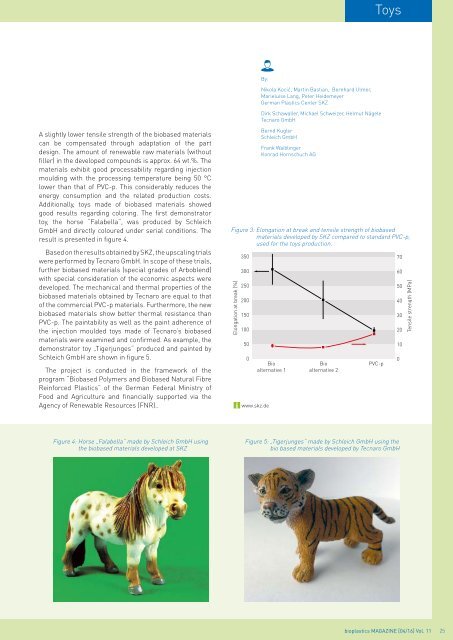Issue 04/2016
bioplasticsMAGAZINE_1604
bioplasticsMAGAZINE_1604
You also want an ePaper? Increase the reach of your titles
YUMPU automatically turns print PDFs into web optimized ePapers that Google loves.
Toys<br />
By:<br />
Nikola Kocić, Martin Bastian, Bernhard Ulmer,<br />
Marieluise Lang, Peter Heidemeyer<br />
German Plastics Center SKZ<br />
Dirk Schawaller, Michael Schweizer, Helmut Nägele<br />
Tecnaro GmbH<br />
A slightly lower tensile strength of the biobased materials<br />
can be compensated through adaptation of the part<br />
design. The amount of renewable raw materials (without<br />
filler) in the developed compounds is approx. 64 wt.%. The<br />
materials exhibit good processability regarding injection<br />
moulding with the processing temperature being 50 °C<br />
lower than that of PVC-p. This considerably reduces the<br />
energy consumption and the related production costs.<br />
Additionally, toys made of biobased materials showed<br />
good results regarding coloring. The first demonstrator<br />
toy, the horse “Falabella”, was produced by Schleich<br />
GmbH and directly coloured under serial conditions. The<br />
result is presented in figure 4.<br />
Based on the results obtained by SKZ, the upscaling trials<br />
were performed by Tecnaro GmbH. In scope of these trials,<br />
further biobased materials (special grades of Arboblend)<br />
with special consideration of the economic aspects were<br />
developed. The mechanical and thermal properties of the<br />
biobased materials obtained by Tecnaro are equal to that<br />
of the commercial PVC-p materials. Furthermore, the new<br />
biobased materials show better thermal resistance than<br />
PVC-p. The paintability as well as the paint adherence of<br />
the injection moulded toys made of Tecnaro’s biobased<br />
materials were examined and confirmed. As example, the<br />
demonstrator toy „Tigerjunges“ produced and painted by<br />
Schleich GmbH are shown in figure 5.<br />
The project is conducted in the framework of the<br />
program “Biobased Polymers and Biobased Natural Fibre<br />
Reinforced Plastics” of the German Federal Ministry of<br />
Food and Agriculture and financially supported via the<br />
Agency of Renewable Resources (FNR)..<br />
www.skz.de<br />
Bernd Kugler<br />
Schleich GmbH<br />
Frank Waiblinger<br />
Konrad Hornschuch AG<br />
Figure 3: Elongation at break and tensile strength of biobased<br />
materials developed by SKZ compared to standard PVC-p,<br />
used for the toys production.<br />
Elongation at break (%)<br />
350<br />
300<br />
250<br />
200<br />
150<br />
100<br />
50<br />
0<br />
Bio<br />
alternative 1<br />
Bio<br />
alternative 2<br />
PVC-p<br />
70<br />
60<br />
50<br />
40<br />
30<br />
20<br />
10<br />
0<br />
Tensile strength (MPa)<br />
Figure 4: Horse „Falabella“ made by Schleich GmbH using<br />
the biobased materials developed at SKZ<br />
Figure 5: „Tigerjunges“ made by Schleich GmbH using the<br />
bio based materials developed by Tecnaro GmbH<br />
bioplastics MAGAZINE [<strong>04</strong>/16] Vol. 11 25


















